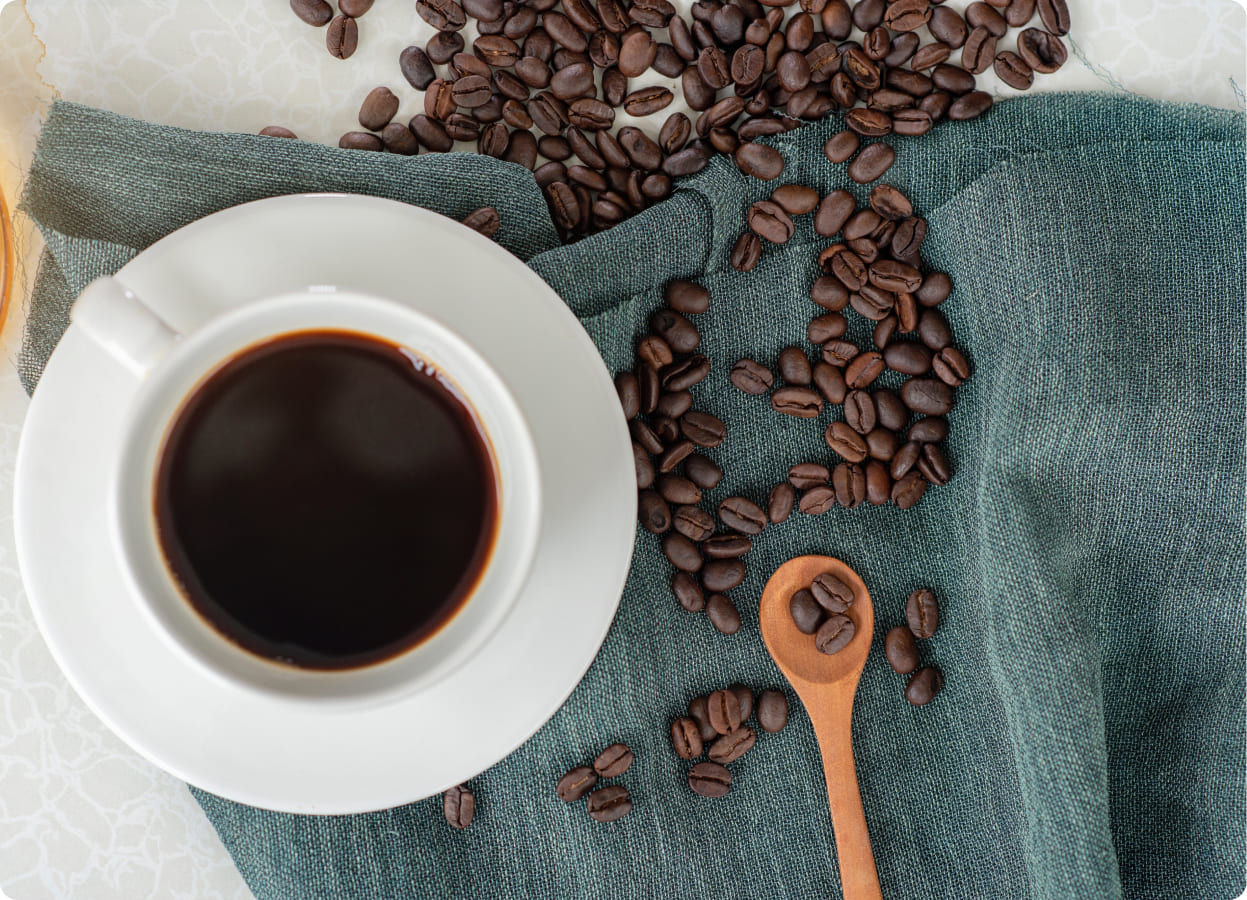How your morning cup of coffee could supercharge your workout performance
In this article, we'll be uncovering the dynamic relationship between your daily cup of coffee and your workout performance.

Source: Pexels
You know that warm, comforting feeling you get from your first sip of morning coffee? Not only does it wake you up, but it also turns out it could be giving your workout a major boost too. In this article, we'll be uncovering the dynamic relationship between your daily cup of coffee and your workout performance.
So, how does coffee do this? Does the magic lie in the caffeine or are there other hidden superheroes in our humble coffee cup? And if coffee can indeed enhance our workouts, how do we maximise these benefits? But wait, are there any caveats we should be aware of? Don't worry, we'll be answering all these questions in this article.
Who knows, you might just find yourself savouring your morning brew a little more, not just for its comforting warmth and familiar aroma, but also for its surprising role as your workout companion. Let's dive right in!

Source: Pexels
Understanding the science behind coffee
When you take that first morning sip, caffeine begins its journey through your body, making its way to the brain. Once there, it pulls the handbrake on a neurotransmitter called adenosine. Typically, adenosine promotes sleep and relaxation - it's the party pooper of the brain.
But when caffeine steps in, it puts adenosine on mute, letting other stimulating neurotransmitters like dopamine take the centre stage. Result? You feel more awake, alert, and ready to take on the world... or in our case, the gym.
Coffee is also packed with antioxidants - these little warriors fight against free radicals in our bodies, promoting overall health. In fact, for many people, the humble coffee is one of the largest sources of antioxidants in their diet.

Source: burst.shopify
Coffee and physical performance
Remember when we talked about caffeine putting the breaks on adenosine, our body's natural sleep-promoting compound? Well, when adenosine is blocked, it allows other neurotransmitters like dopamine to run wild.
Dopamine is a pretty interesting neurotransmitter – it plays a key role in how we perceive pleasure and pain. This means when we're flooded with dopamine, we might feel less discomfort during those tough workouts, enabling us to push a little bit harder, run a bit longer, lift a tad heavier. Who doesn't want that kind of workout superpower?
Some research suggests that caffeine can also help our bodies burn fat more effectively. When you ingest caffeine, it can help free up the fats stored in your body, allowing them to be used as fuel during your workout. Basically, you could be turning your body into a fat-burning machine, just by enjoying your morning cup of coffee!
Let's also consider the mental edge that coffee provides. That heightened alertness and focus? They're not just useful for acing your morning meetings, but also for staying focused during your workout. And let's be honest, a focused workout is typically a more effective workout.
Now, just imagine combining all these factors: the increased pain tolerance, the boosted fat burning, and the heightened focus. It seems like your morning cup of coffee might be the perfect pre-workout partner, doesn't it?
But wait, before you run off to down a gallon of coffee before your next gym session, let's talk about how to use it effectively (and safely). After all, while coffee might be a potent workout ally, it's essential to remember that it's a tool, not a magic potion. So, ready to find out how to wield this tool most effectively? Let's dive deeper.

Source: Pexels
How to use coffee for workout performance?
We've established that coffee can be a supercharged ally in your workout routine. But how do we translate this knowledge into action? How much coffee should you drink? When should you drink it? And most importantly, how can you make it a part of your routine without turning into a jittery, caffeine-fueled mess? Let's find out!
Timing is crucial when it comes to maximising coffee's workout benefits. If you're like most people, you probably have your coffee first thing in the morning. But if you're planning to hit the gym, you might want to time your coffee intake a little differently.
Studies suggest that caffeine's peak effects are felt about 30 to 60 minutes after consumption. So, sipping your coffee about an hour before your workout could ensure that caffeine’s performance-enhancing effects kick in just when you need them most.
But what about the quantity? How much coffee is "enough"? As with most things in life, moderation is key. A general guideline suggests around 3 to 6 mg of caffeine per kilogram of body weight. For most of us, that means a strong cup of coffee should do the trick. But remember, everyone’s body responds to caffeine a little differently, so it's important to listen to your body and adjust accordingly.
But how do we incorporate it into our pre-workout routine? Simple, really. Just treat it as your pre-workout fuel. You can enjoy it while you're gearing up for the gym, putting on your workout clothes, or even during your commute to the gym. It's like a little ritual that prepares your mind and body for the workout ahead.
However, it's important to note that while coffee can supercharge your workout, it doesn't replace a balanced pre-workout meal or adequate hydration. Yes, coffee can give you a mental and physical edge, but it won’t compensate for poor nutrition or dehydration. So, make sure to pair your pre-workout coffee with a nutritious meal and plenty of water.
Alright, it seems like we've cracked the code to using coffee for workout performance. But, before we get too carried away, let's discuss some potential downsides and risks that we should be mindful of.

Source: Pexels
Potential risks and downsides
Just like anything in this life, even a cup of coffee also has potential risks and downsides . As we dive into the world of coffee-powered workouts, it's important we also discuss potential risks and downsides. We know, it sounds like a bummer, but hey, it's better to be informed, right?
First off, it's essential to remember that while caffeine can be a great workout enhancer, it can also lead to jitteriness and anxiety if you overdo it. If you've ever felt your heart racing after one too many cups of coffee, you know what I'm talking about. So, while it's tempting to chug down more coffee for that extra 'oomph' in your workout, moderation is key.
Secondly, it's worth noting that caffeine can lead to a build-up of tolerance. Essentially, the more frequently you consume caffeine, the less responsive your body becomes to its effects. So, if you're guzzling down coffee every day before your workout, you might find its superpowers start to wane over time. To prevent this, consider cycling your caffeine intake, or saving your coffee-fueled workouts for when you really need that extra push.
Then there's the risk of dependence. As many coffee lovers can attest, caffeine can be mildly addictive. If you've ever experienced a caffeine withdrawal headache, you'll know it's not a pleasant experience. This is another reason why it's essential to maintain a balanced relationship with your brew, and not rely on it excessively for your workout performance.
Lastly, let's talk about hydration. Yes, coffee is a liquid, but it's also a diuretic, which means it can make you pee more, potentially leading to dehydration. While this effect is usually minor for regular coffee drinkers, it's something to keep in mind, especially if you're working out intensively. Make sure to drink plenty of water alongside your coffee, to ensure you stay well hydrated.
So, does this mean you should ditch the idea of a coffee-fueled workout? Absolutely not! It just means that as with anything in life, balance and moderation are crucial. Now that we've got a rounded view of our beloved morning cup's strengths and weaknesses, let's take a quick look at alternatives for those who may not get along with coffee.

Source: burst.shopify
Other alternatives beverages to coffee for performance enhancement
Now, we know what you're thinking. What if you're not a coffee person? Or what if you're sensitive to caffeine? Does that mean you're left out of the workout supercharging club? Absolutely not! There are plenty of alternatives to coffee that can also give your workout a boost. So, let's explore some of these, shall we?
1. Green Tea: This calming beverage is not just for relaxation. It contains a modest amount of caffeine, enough to give you a slight boost without overdoing it. Plus, it's packed with antioxidants, much like coffee. So, if you're looking for a milder, less jittery alternative to coffee, green tea could be your perfect match.
2. Beetroot Juice: This might sound a bit unusual, but beetroot juice is rich in nitrates. Your body can convert these nitrates into nitric oxide, a compound that helps improve blood flow and can potentially enhance your workout performance. Plus, it's a great way to incorporate some extra veggies into your diet!
3. Sports Drinks: These beverages are typically loaded with electrolytes to keep you hydrated during your workout. Some even contain a small dose of caffeine for that extra kick. Just be mindful of the sugar content in some brands - you don't want to counteract all your hard work at the gym!
4. Water: Never underestimate the power of staying well-hydrated. While water might not give you the same 'kick' as a cup of coffee, it's essential for keeping your body functioning at its best during a workout.
Conclusion
So, what's the takeaway from all this? Simply put, your morning cup of coffee can be more than just a wake-up call. It can be a powerful ally in your fitness journey, helping you push harder, focus better, and maybe even burn fat more efficiently.
But remember, as with anything in life, balance is key. While coffee can certainly enhance your workout, it's not a magic potion. It's a tool, and like any tool, it's most effective when used properly. So, enjoy your pre-workout coffee, but don't forget to also fuel your body with nutritious food and plenty of water.
And for those of you who aren't coffee fans, don't worry. As we've seen, there are plenty of other ways to boost your workout performance. Whether it's green tea, beetroot juice, a sports drink, or just good old-fashioned water, there's something for everyone.
So, the next time you reach for your morning cup of coffee, take a moment to appreciate it. Not just for its comforting warmth or its ability to wake you up, but for its potential to supercharge your workout. Who knows, this could be the start of a whole new fitness journey for you.
And with that, we wrap up our exploration of coffee and workouts. We hope you've found it as enlightening and exciting as we do writing it. Now, go forth, enjoy your coffee, and conquer your workouts!
Good luck!
Friska 🐨
Read next: 5 post-workout nutrient-rich foods that speed muscle repair
Do you want to see more content like this? Follow us on Instagram and Facebook for more wellness advice, fitness trends, workout inspiration, and even best health and fitness deals exclusive to our followers. Don’t miss out!

